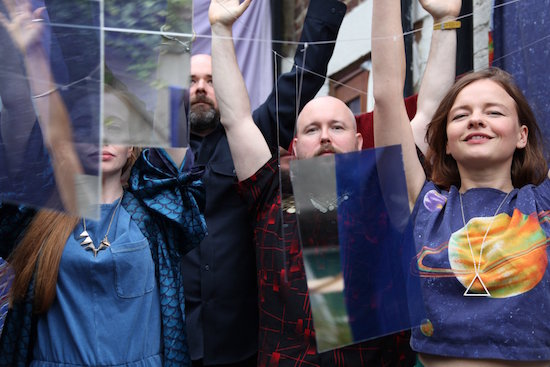A year and a half on from his universally lauded, lore-revising masterpiece Peasant, Richard Dawson has reconvened with long-time collaborator and harpist Rhodri Davies and singer and multi-instrumentalist Dawn Bothwell for Hen Ogledd’s follow-up to 2016’s Bronze. The addition of Sally Pilkington has made the band a quartet, and going by Mogic, she and Bothwell (who joined in 2016) have transformed this uniquely egalitarian project with their incisive songwriting and the immense character of their singing. With Mogic, Hen Ogledd (which is the Welsh name for ‘The Old North’, the region covering southern Scotland and northern England in the early Middle Ages) have moved away from the improvised meanderings of Dawson and Davies towards a more taut and arguably less ethereal aesthetic. There is an analytical and intellectual rigour in its embracing of themes that emerge from contemporary day-to-day existence, specifically regarding the digital sphere and the impact of machines.
Perhaps the most immediately striking thing about Mogic is the wild diversity, not to say towering excellence, of its vocal performances. It is not just the fact that singing duties are shared between Pilkington, Bothwell and Dawson (whose main role here is on bass). It is also the studio distortions applied to vocals, the style of delivery and the inclusion of voices from outside the band. I challenge any listener to find more beautiful use of the often-maligned vocoder than on the chorus of ‘Sky Burial’, sung by Pilkington. The same modifier is used to more menacing effect on the frenetic mash-up, ‘Dyma Fy Robot’ and Pilkington’s voice is similarly toyed with on the dreamily funky ‘Tiny Witch Hunter’, to the extent that she sounds part computerised speech, part mouse-squeak. On ‘Gwae Reged o Heddiw’ a young girl is quietly taught a Welsh poem. Spoken-word poetry also appears courtesy of Bothwell’s forceful Scottish brogue on the unhinged ‘Transport & Travel’. I could go on: there is no voice, in terms of the album’s actual orality or in the literary sense, that is consistent on Mogic – and it is magnificent as a result.
It makes for a thrilling listen – the ultimate album that can’t stay still. It also presents fascinating ideas regarding multiculturalism and pluralism. Mogic has no overarching tone or identity – it is a cauldron of values, consciousnesses and experiences. It is a reassuringly inviting and welcoming thing, even with its many abrasive elements and its experiments with sonic collage and curious effects.
And this connects to the band’s name. If we see the cascading, lurching music on Mogic as all that might come under the banner of ‘The Old North’, then we see that communities stretch and expand in all manner of directions, belying the labels put on them. The name ‘Hen Ogledd’ or ‘The Old North’ might conjure the idea of a group like the Incredible String Band or Circulus, smitten with medieval instruments, pagan imagery and other nonsense, but such expectations are quashed as these four musicians plot a rich, diverse soundscape. Mogic serves as a reminder that there is little uniformity among the actual people behind the labels for geographical regions, time periods and social groups. The North, the South, whenever it supposedly was that America was Great: there is an ever-changing multiplicity of voices within each – a fact often obscured.
The other major theme of Mogic is technology, as a lyrical theme and as a constant presence in the album’s unpredictable production. Several tracks deal with how our sense of self is redefined and frequently confused by evolving modes of communication. ‘Sky Burial’ addresses how our digital imprint will outlast our physical bodies, and aligns cloud computing with the Tibetan and Zoroastrian death ritual. ‘Problem Child’, sung by Dawson, muses on how folk culture is continually updated and reconstructed online, and how we each risk alienation by not embracing it: “I don’t want to be a part of the problem / I just want a little piece of the action,” he sings. Bothwell’s ‘First Date’ opaquely depicts the disorienting complexities of finding companionship in this new cultural landscape.
Mogic suggests that the daunting advance of technology is actually no threat to the age-old and the traditional, and might easily be incorporated into it (in this they have something in common with Simon Emmerson’s Imagined Village). That said, the record ends on a sombre note with a superb, ghostly track from Pilkington. ‘Ethelreda’ (named after the Anglo-Saxon saint from East Anglia), a slow, minimal, reverb-drenched piece, laments the fragmented way relationships are conducted amid screens and data – “I stitch together tiny snippets / Small things that you do / Patterns of you” – before ending with the repeated mantra of “I don’t feel anything.”
All of this should not give the impression that Mogic is a terribly intellectual or cerebral affair. The album contains some irresistibly catchy and expertly crafted art-pop with ‘Sky Burial’ and ‘Problem Child’ (which features intoxicatingly propulsive bass playing from Dawson to go alongside the familiarly intense gusto of his singing). Eclipsing both of these tracks, though, are ‘First Date’ and ‘Ethelreda’. On ‘First Date’ Bothwell sings a true earworm of a melody over synth-based controlled chaos and a skittering, staccato-y rhythm. ‘Ethelreda’ is simply a piece of stunning, elegiac beauty with echoes of Anne Briggs.
The word ‘mogic’ is apparently a mix of ‘magic’ and ‘logic’, in which the poetic and mystical collides with the technological and scientific. The tension between the two ripples through Mogic, a triumph full of ideas, energies, angles, beings, non-beings, constructions and monsters; a kaleidoscopic concoction of music and social critique.




